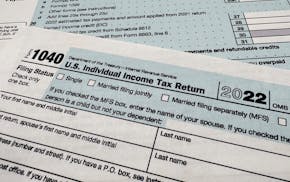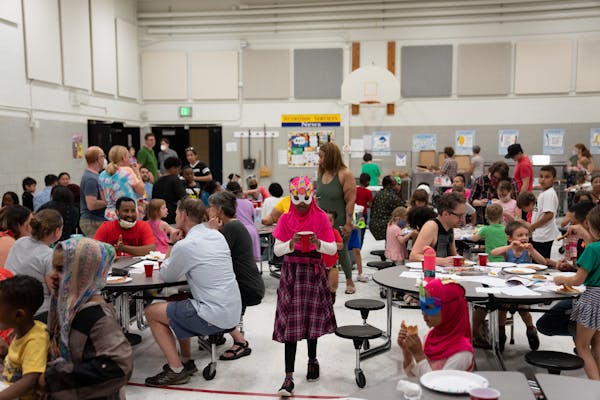Like many Minnesota parents, Natasha Roberts spent the summer of 2020 looking for a school that guaranteed her children could attend classes in person. Before that, she'd never considered sending her kids to a private school.
"I thought it was a great option for people who wanted that for their kids," said Roberts, whose children had been enrolled in Wayzata public schools. "But we were in a school district we were more or less happy with."
However, after a year at Redeemer Christian Academy — a small Christian school that straddles the border between Wayzata and Orono — Roberts' attitude took a 180-degree turn. Her kids probably won't attend a public school again.
The Roberts family's story illustrates a broader trend among smaller metro-area private schools: Although enrollment growth has slowed, those schools are seeing higher-than-usual retention among new enrollees, according to principals and observers.
"If they chose to attend a non-public or a private school, they found a strong community," said Tim Benz, president of Minndependent, a coalition of more than 150 Minnesota private schools. "The retention of those families is paramount."
Private schools statewide grew their enrollment by nearly 4% last fall, according to state data. While that's less than the increase they posted in 2021, that growth has remained a boon for smaller private schools across the Twin Cities, many of which have had to hire new staffers and add classroom space to accommodate increased demand.
At St. Rose of Lima Catholic School in Roseville, Principal Sean Slaikeu hired a counselor for the first time to handle low-level disciplinary cases, now that he's got twice as many students as he did in 2019.
"It takes down the level of severity of when a student has an issue," he said. "Instead of going to the principal and it becoming this huge alarm, it becomes more of a restorative piece."
When enrollment surged by 27% in the fall of 2020, Principal Dan Hurley of St. John's School in Little Canada noticed several of his new students were far behind in reading. Over the next two summers, he added reading specialists to the payroll and began an intensive remedial program for students in kindergarten through third grade.
As word of the program spread in nearby Roseville, Vadnais Heights and other communities, Hurley fielded more and more inquiries from parents eager to enroll. St. John's had 122 students in its K-8 program in 2019. Three years later, the school had 212.
"I think what's special for us is that we're able to tell parents that we're offering these things that are going to get your kids back on track," Hurley said.
At Redeemer in Wayzata, Principal Natalie Raabe has hired a second kindergarten teacher to meet growing demand. Years ago there were so few seventh and eighth graders that they took many of their classes together. Now each grade has its own dedicated teachers.
Redeemer had a total enrollment of 80 in 2019. This year, the school has 158 students in its K-8 program.
"It's been an adjustment," Raabe said. "But I would rather have challenges of growth rather than challenges of getting people in the door."
Looking for a community feel
Roberts, whose kids are in pre-kindergarten, third grade and eighth grade at Redeemer, said her family enjoys being part of a smaller school. Among other things, she was surprised by how much more her children were using textbooks at Redeemer than at their previous schools.
"When you go to public school, they have a lot of resources — they use a lot more technology," Roberts said. "I don't love learning on an iPad, especially at the elementary school age."
Noah Rouen, whose four children attend Redeemer, said parents talk about how personal the experience feels at such a small school, and appreciate that the principal greets pupils and parents at the front door each morning.
"The fact that Natalie is out there, whether it's 10 below zero or 70 and sunny, makes a difference," he said.
Like other private school principals, Raabe wasn't sure whether the initial enrollment surge Redeemer saw in the fall of 2020 would last. She and other school leaders said they had several blunt conversations with prospective families — they didn't want parents to make an off-the-cuff decision just because their school offered in-person learning.
"The concern I had was that people were going to come to school specifically because of that," Slaikeu said.
For Adam Groebner, principal at St. Therese Catholic School in Deephaven, growth has been a constant for nearly a decade.
He opened an early childhood education center in 2016, about the same time the parish was experiencing an increase in members. The concurrent growth in both church and school meant that classrooms were at capacity by the time summer 2020 rolled around. St. Therese's K-8 program had 142 students at the time.
"There wasn't a lot of wiggle room," Groebner said. "A lot of the families that came in were already affiliated with our school or our church."
Still, the school took on 176 students in the fall of 2020. Since then, St. Therese has undergone two remodels to reconfigure existing space to create more classrooms.
This year, enrollment sits at 232 and Groebner is considering remodeling a couple of rooms beneath the church to add another kindergarten class.
He credits the early childhood education programs in part for facilitating much of that long-term growth. At St. John's in Little Canada, Hurley said the school's new pre-kindergarten programs also has attracted several families.
As demand increased there, Hurley decided to extend some of St. John's programming for its littlest learners. For the last of couple years, pre-kindergartners there have had access to reading specialists. Unlike the cohort that began in fall of 2020, they now wear the same uniforms as their older peers.
Parents have told Hurley that little things like that have helped them decide to keep their children enrolled there.
"It really came down to that community feel," he said.
New Minnesota GOP leaders seek peace with party's anti-establishment wing

Who is Republican Lisa Demuth, Minnesota's first House speaker of color?

Minnesota House GOP, Secretary of State Steve Simon return to Supreme Court
Supreme Court sides with DFL and Simon, says 68 House members needed for floor action

